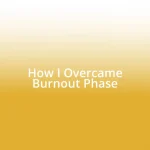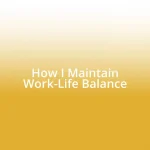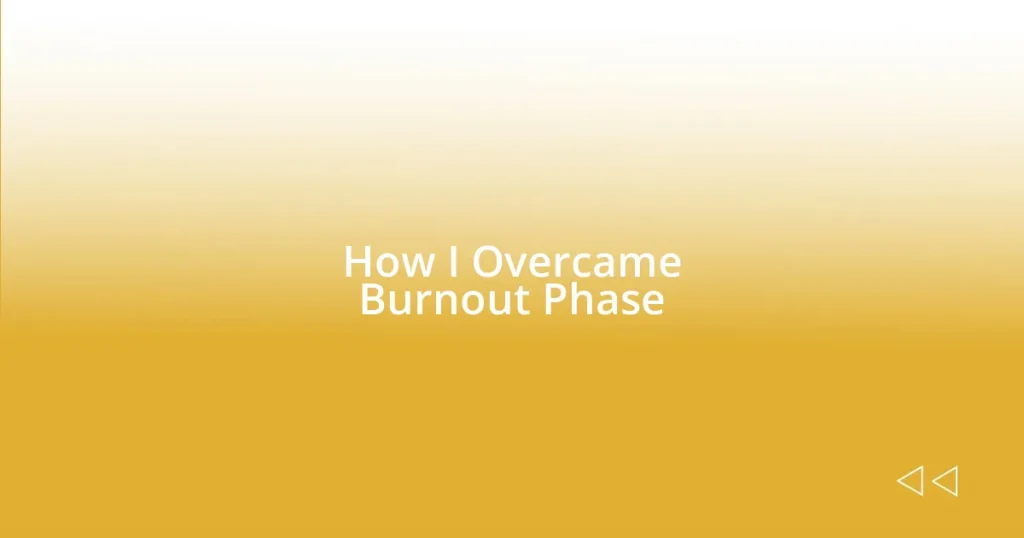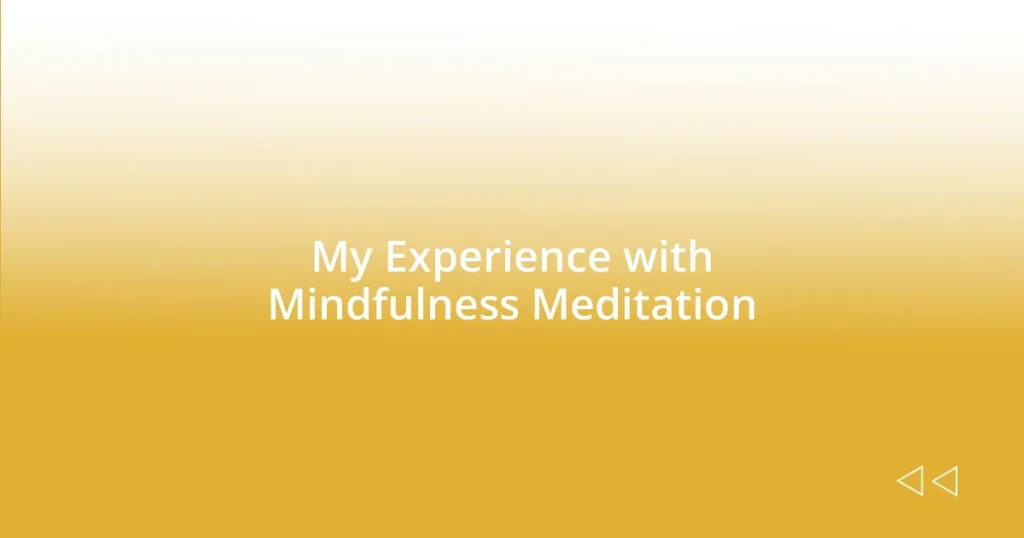Key takeaways:
- Burnout is often caused by overwhelming stress, lack of control, and misaligned values in one’s work environment.
- Recognizing early symptoms of burnout—such as fatigue, detachment, and irritability—is crucial for timely intervention.
- Implementing practical coping strategies, like regular breaks and establishing work-life boundaries, can significantly restore balance.
- Seeking professional support, including therapy and group discussions, can provide new perspectives and a sense of community during recovery.
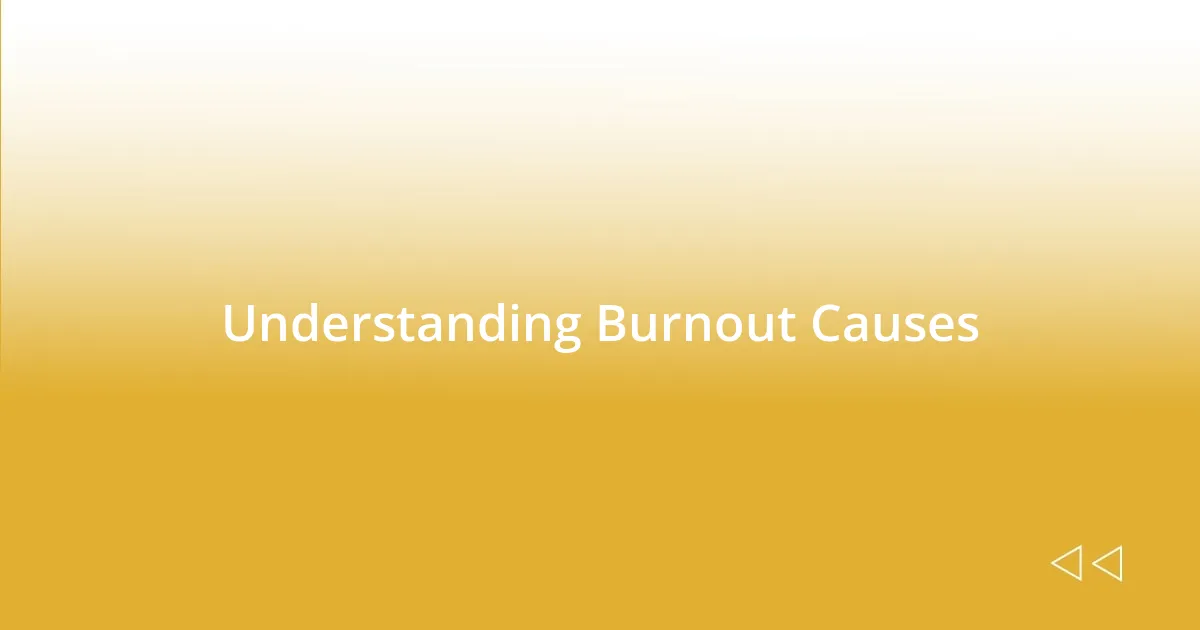
Understanding Burnout Causes
One significant cause of burnout is the overwhelming presence of stress, which often creeps up on us. I remember a time when my workload increased dramatically, and instead of taking a step back, I pushed myself harder. Looking back, I wonder if I might have prevented a lot of anxiety if I had simply acknowledged my limits sooner.
Another factor is a lack of control over our work environment and schedules. During one particularly hectic project, I felt like a puppet on strings, directing my energy wherever it was demanded without any say in the matter. Have you ever noticed how disempowerment can sap your motivation, leaving you feeling more like a cog in a machine rather than the driving force of your own life?
Finally, I’ve learned that misaligned values can also contribute to feelings of burnout. There was a point when I was working in a role that didn’t resonate with my beliefs or passions. It led me to question not just my job, but my overall purpose. Have you felt that deep disconnect too? It’s crucial to find alignment between what you do and what you truly value; otherwise, the daily grind can feel soul-draining.
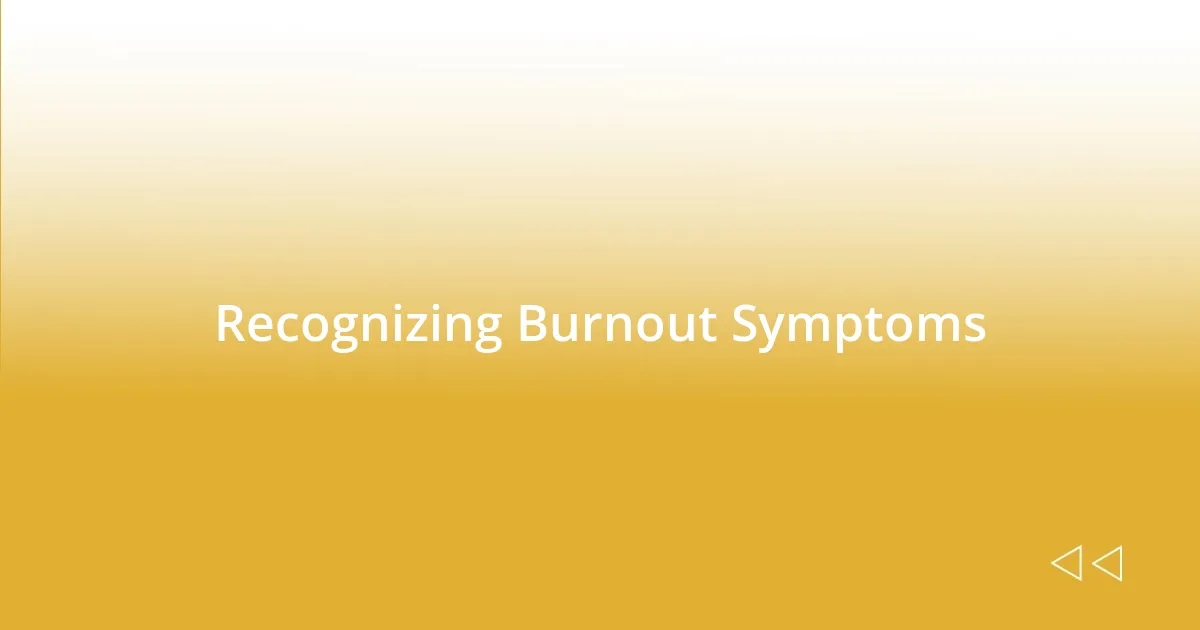
Recognizing Burnout Symptoms
Recognizing the symptoms of burnout is crucial for taking the necessary steps toward recovery. Initially, you may feel subtle signs of exhaustion, like a constant sense of fatigue that doesn’t seem to lift, no matter how much rest you get. For me, that drained feeling started as a few long days at work, but soon it morphed into a persistent haze. Have you ever had that overwhelming sense of tiredness, even after a weekend off? It’s an early sign that shouldn’t be ignored.
Another symptom I found myself grappling with was a profound sense of detachment from my work and even from my colleagues. I remember sitting in meetings, nodding along, but mentally I was miles away. It’s as if I was just going through the motions without truly participating. That emotional disconnect can be alarmingly isolating, making you feel like you’re on your own island while everyone else is enjoying the party.
Lastly, irritability can be one of the more striking symptoms of burnout. I found myself snapping at coworkers for minor inconveniences, which left me feeling guilty afterward. It’s like a storm brewing inside you, ready to explode over small things. Have you had moments where you reacted out of frustration? Recognizing these emotional signs can help you pinpoint if burnout is creeping in. Addressing these feelings early can make a significant difference in regaining control over your emotional and mental well-being.
| Symptom | Description |
|---|---|
| Fatigue | A persistent sense of tiredness, even after rest |
| Detachment | Feeling disconnected from work and colleagues |
| Irritability | Increased frustration or anger over minor issues |
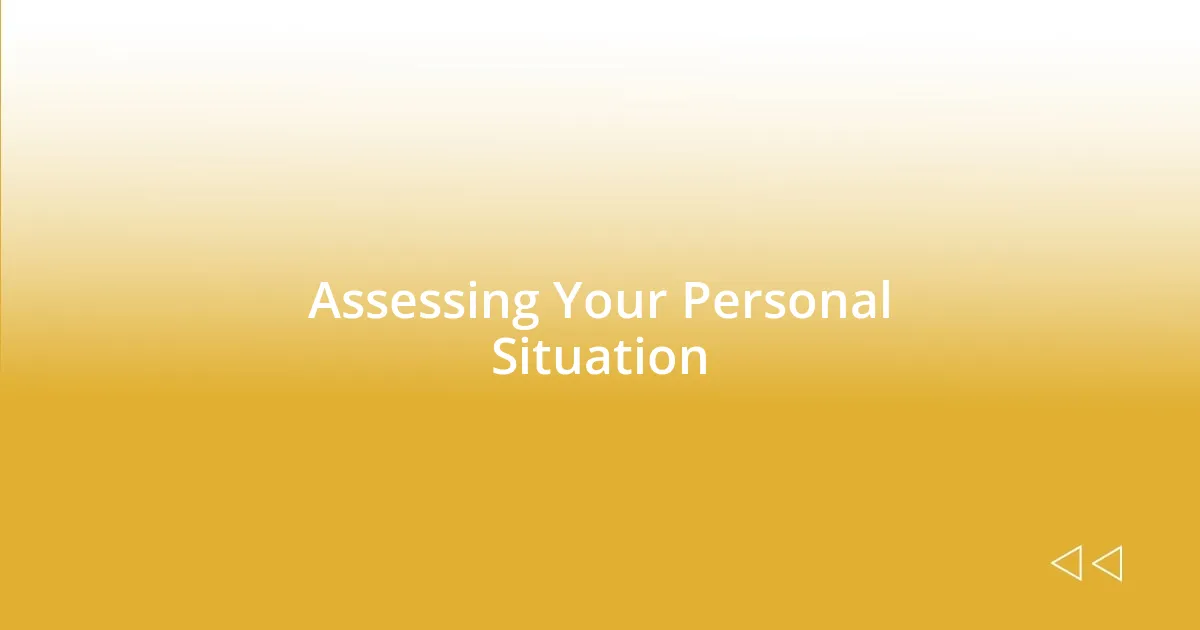
Assessing Your Personal Situation
Assessing Your Personal Situation
Taking a moment to truly assess your personal situation can be eye-opening. When I found myself at the edge of burnout, I realized that simply ticking off tasks was no longer fulfilling; I had to dig deeper. Reflecting on my daily routine allowed me to identify not only the pressures thrust upon me but also the choices I had been making that contributed to my stress levels. Have you ever sat down and mapped out what really weighs you down?
- Identify Stressors: List the sources of stress in your life, from work demands to personal commitments.
- Examine Your Values: Think about the alignment between your current activities and your core beliefs.
- Evaluate Time Management: Analyze how you allocate your time. Are you prioritizing what truly matters to you?
- Assess Support Systems: Consider who is in your corner and how they can help you navigate this phase.
- Check Your Energy Levels: Keep a journal of when you feel most energized versus drained throughout the week.
Another vital aspect of this assessment involves being honest with yourself about what needs to change. It was during a quiet evening with a cup of tea that I silently recognized I was a little too comfortable in my discomfort. I had been avoiding conversations about my workload and my needs. Sometimes it’s challenging to accept that you may have to set boundaries or even change your role. But acknowledging this reality is a pivotal step on the path to healing. What about you? Do you feel ready to confront these truths?
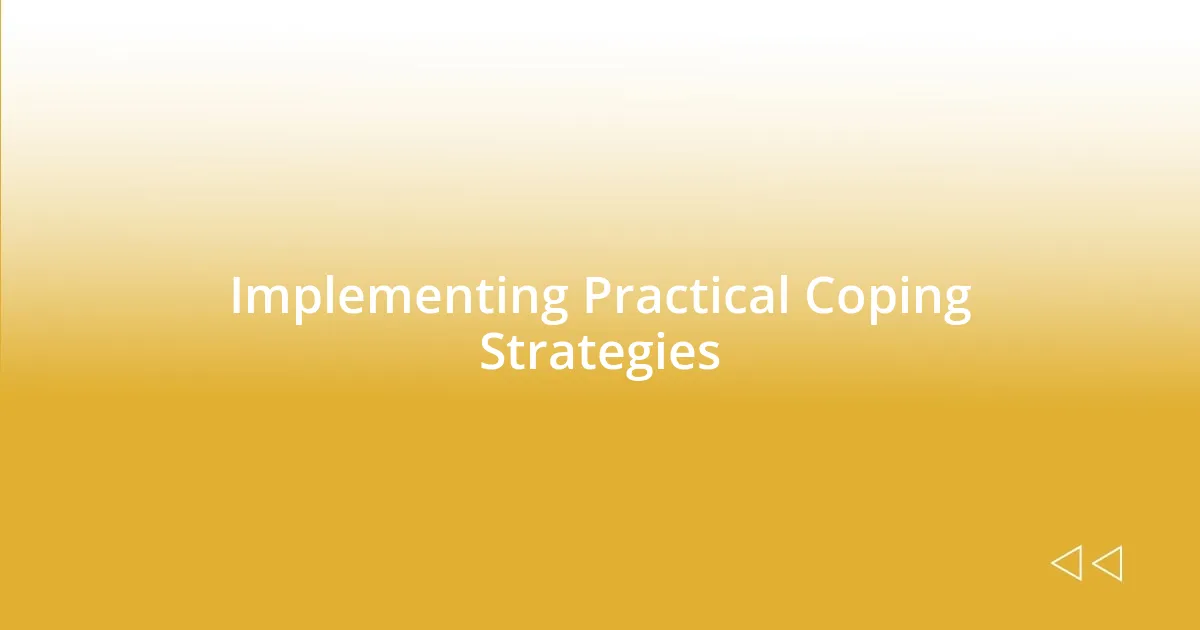
Implementing Practical Coping Strategies
Implementing practical coping strategies is essential in mitigating burnout and restoring balance. One of the first strategies I adopted was scheduling regular breaks throughout my day. Initially, it felt awkward to step away when I had a mountain of tasks to tackle, but I quickly learned that a few moments to breathe or take a quick walk rejuvenated my mind. Have you ever noticed how a simple pause can shift your perspective?
Another effective method for me was to establish clear boundaries between work and personal life. I remember setting a firm “end time” for my workday, which seemed daunting at first. However, once I committed to logging off and truly stepping away from work emails and messages, I found space to reconnect with my hobbies and loved ones. Does it resonate with you to carve out that personal time, even when the demands feel overwhelming?
Lastly, I incorporated mindfulness exercises into my routine. Starting with just five minutes of meditation each morning transformed my approach to stress. It was there, sitting quietly, that I began to acknowledge my thoughts without judgment. This practice not only grounded me but also equipped me with tools to handle stressful moments as they arose. Have you tried connecting with your inner self in such a tangible way to navigate through challenges?
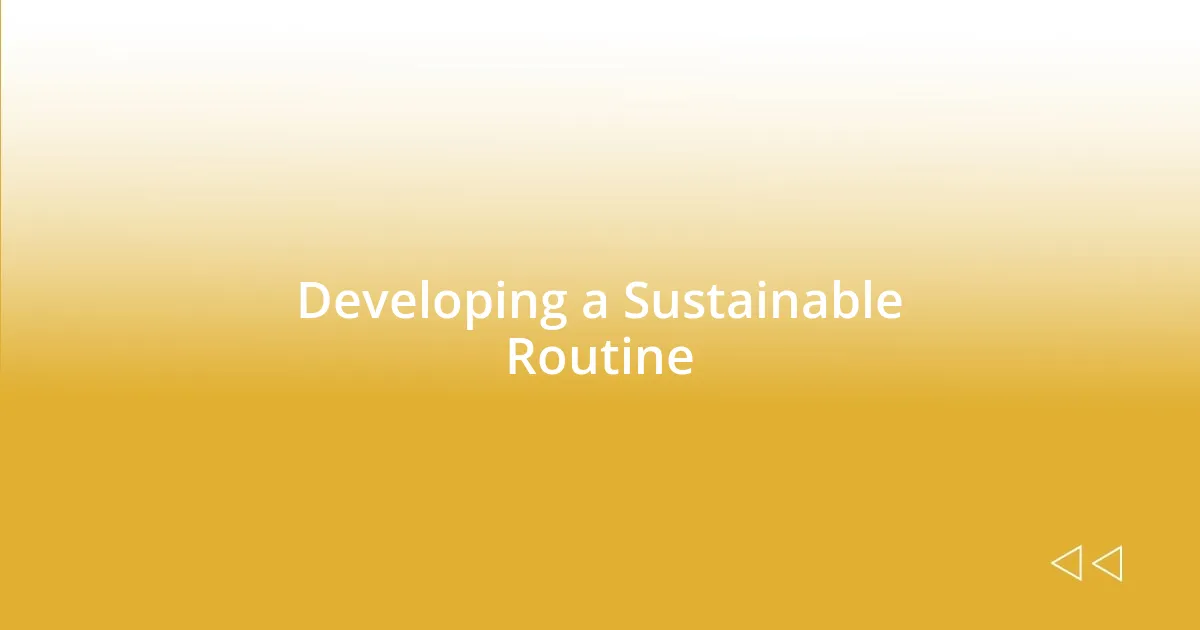
Developing a Sustainable Routine
Developing a sustainable routine was my game-changer in overcoming burnout. I found that integrating small, manageable tasks into my day anchored me. For instance, I designated my mornings for exercise, a habit I previously neglected. It felt weird at first, prioritizing sweat over emails, but those early workouts became my moment of clarity. Have you experienced how starting the day with intention can shift your entire mood?
Another vital element was creating a weekly planner that aligned with my energy levels. I began labeling my most productive hours and scheduling challenging tasks during those peaks, reserving quiet time for less demanding work. At first, this felt tedious, almost like a chore, but I quickly realized how effective it was. The joy of looking at my calendar and feeling empowered by my choices after months of chaos was simply exhilarating. Have you ever tried aligning your tasks with your natural rhythm?
It was equally important for me to regularly reassess what was truly essential in my life. I discovered that some commitments were draining rather than enriching. One weekend, I chose to say no to an event I typically felt obligated to attend, and instead spent that day indulging in my favorite books. That simple decision sparked a realization: prioritizing what genuinely brings joy can invigorate not just my routine but my entire outlook on life. Do you feel ready to make room for what truly matters in your life?
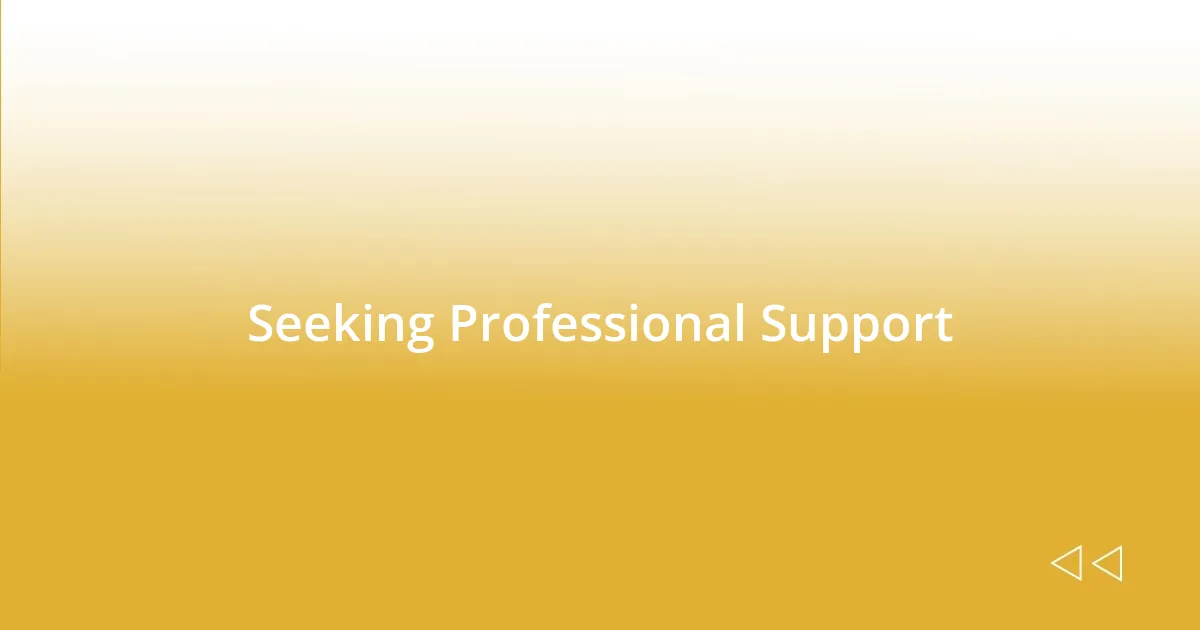
Seeking Professional Support
Sometimes, reaching out for professional support can feel intimidating. I remember my first visit to a therapist; my heart raced as I walked into the office, wondering if I’d made the right choice. However, that initial discussion opened a door to understanding my feelings in a way I hadn’t before. It was reassuring to know that there’s no shame in admitting you need help, right? Talking to someone trained to guide you can be a crucial step in reclaiming your life from burnout.
As we navigate the complexities of burnout, I’ve found that the strategies offered by professionals often unveil fresh perspectives. For example, my therapist introduced me to cognitive-behavioral techniques, which helped me challenge negative thoughts that fueled my exhaustion. I vividly recall the moment I realized that my inner dialogue was often harsher than I would have ever spoken to a friend. Wouldn’t it be interesting to treat ourselves with the same kindness we readily extend to others?
Additionally, engaging in group therapy provided a sense of community I desperately needed. Sharing experiences and listening to others who were also struggling created a supportive network that felt like a lifeline. There were times I left those sessions feeling lighter, almost as if the shared burden had made each weight less daunting. Have you ever felt the power of collective healing and mutual support?
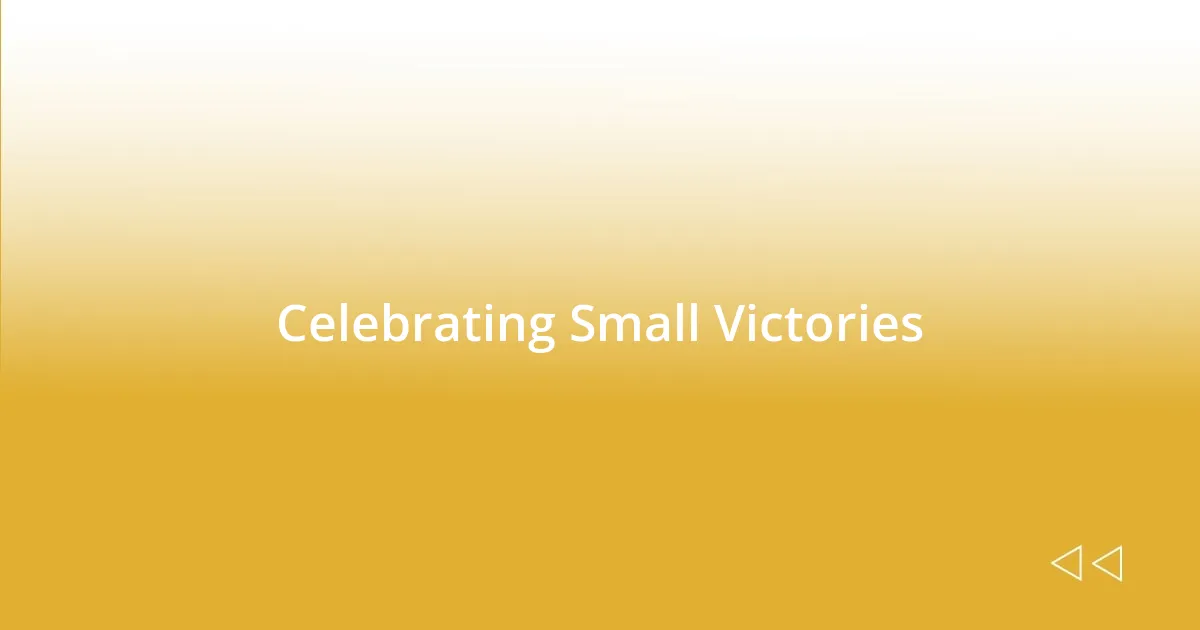
Celebrating Small Victories
Celebrating small victories became an essential part of my recovery from burnout. Every time I ticked an item off my to-do list, even if it was as simple as organizing my desk or making a healthy meal, I felt a spark of joy. Have you ever taken a moment to recognize the effort behind even the simplest tasks? That sense of achievement kept my spirits lifted, reminding me that progress is worthy of acknowledgment, no matter how small.
One particularly memorable moment was when I completed a challenging project ahead of schedule. I resisted the urge to immediately dive into the next task and instead took a moment to celebrate. I treated myself to a nice dinner at my favorite restaurant, savoring every bite with pride. It reinforced a powerful lesson: life shouldn’t solely be about rushing towards the next goal; it’s essential to appreciate what we’ve accomplished along the way. Why wait for the big milestones when the little ones can be just as fulfilling?
What truly surprised me was how these small celebrations had a ripple effect on my motivation. I found myself more engaged and excited about my daily routines, often thinking about what I’d reward myself with at the end of the day. I realized that it’s not just the victory that counts but the practice of recognizing it. So, how often do you take time to celebrate your own achievements? If you haven’t yet, I wholeheartedly encourage you to start celebrating those small victories—you might just find a renewed spark of energy for your journey ahead.



